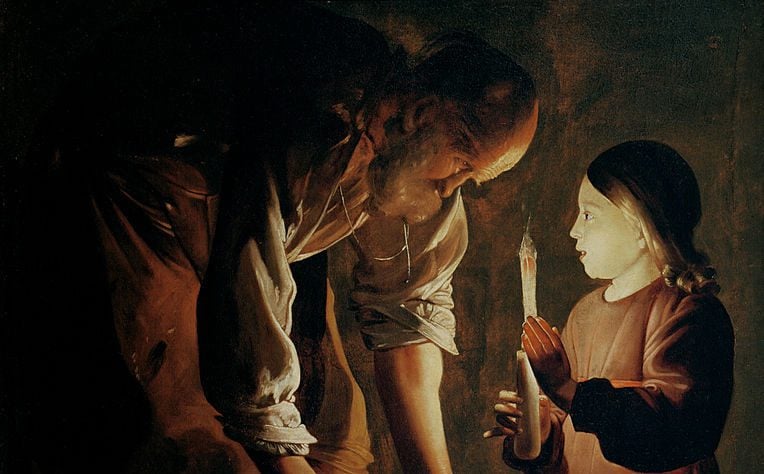I should have written this yesterday, for the feast of St. Joseph, but it didn’t occur to me to do so until this morning.
St. Joseph is one of a small handful of Saints that I’ve felt a kind of personal connection to. There are Saints that I like and that I pray to as distant figures in heaven, historical personages who I admire and wish to imitate, writers whose works I find illuminating or inspiring. Then there are a few that sometimes seem…there’s no word for it except “present.” St. Joseph is one of those.
Generally I encounter him when I’m most fed up with my marriage and with men generally. When I just want to get away and live the independent feminist dream. When I feel like I’ve been patient enough and have put up with enough and I’m through. That’s when St. Joe shows up.
So, yesterday there was a meme circulating for his feast day with the caption: My favourite St. Joseph quote: ” ”
It had never occurred to me before, but yes. With other Saints that I’ve felt to be present in some particular trial or need, I’ve always had a sense of words. Therese of Lisieux offering friendship. St. Lawrence making fun of me for taking myself too seriously. Gerard Manley Hopkins playing with the plasticity of whatever it is that serves for language in Heaven (that one was kind of mind-blowing and sadly my attempts to explain or describe it in dull, quotidian old English have never come even close to capturing it. And yes, I do know that GMH is not a canonized saint.)
With St. Joseph, always silence. Just being there. Steady. Reliable. Considerate. No, more than just steady. Steadying.
St. Joseph is probably, more than anyone, the person who has convinced me that masculinity does not have to be toxic or oppressive. It doesn’t have to be about being in control, or asserting authority, or proving oneself to other men. St. Joe is definitely not a coward. He’s not lukewarm. He’s not a sentimental milquetoast. But he’s also not a swaggerer. When his family is threatened, he doesn’t get himself a sword so that he can fantasize about taking down Herod. He quietly moves them to a safer place in the night. His concern is not to look cool and impress other guys, it’s to do what will actually keep his family safest.
When he finds out that his bride-to-be is pregnant, in spite of the fact that he lives in a highly patriarchal society and tongues are bound to wag, he thinks “How can I deal with this quietly and mercifully?” The fact that he would naturally presume that she had cheated on him almost disappears from the text. His masculine ego is not front and center. This is not about proving that Joseph is a man, and that he will be respected. There’s no evidence that he tried to figure out who had been taking his woman behind his back, or that he had any particular desire for revenge. Instead he Bible tells us that he had two concerns: first, to obey the law. Second, to avoid disgracing her.
St. Joseph’s masculinity is not self-assertive. It’s the kind of masculinity that St. Paul calls for when he tells husbands that they “ought to love their wives as their own bodies.” (Eph 5:28) A masculinity that is focused on the needs of others rather than the gratification of desire, appetites and ego. You can’t imagine St. Joseph bragging to his buddies, or making demeaning comments about women, bullying catamites, or hiding out in his mancave with a stash of pornographic papyrus. When the Angel says, “So, Joe, God impregnated your wife. Don’t be afraid to go ahead and marry her,” he doesn’t bristle or get offended. He doesn’t drown his sorrows at the bar, or go out and blow a bunch of money on a hot new chariot to prove that he’s still the man. He’s a one donkey guy — and his pregnant wife gets to ride the donkey.
He also doesn’t seem to be someone who needs to constantly talk about himself, much less someone who needs to talk over others. People often marvel at how little Mary says in the Gospels. St. Joseph says nothing. We know him only by his actions, which basically involve obeying God and taking care of others.
From a worldly point of view, St. Joseph fails as a man. He is not wealthy. He doesn’t fight the bad guys and win. He flees under cover of darkness. He’s a cuckhold. He doesn’t assert his sexual rights over Mary. He’s not a stud. He doesn’t show off his intelligence. Most of what he does can be described using words that have historically been attributed to femininity: silence, caring, consideration, submission, obedience, humility.This is a masculinity that I can respect. A masculinity that safeguards, supports, upholds, behaves with quiet courage and makes no bid for the limelight. A masculinity that doesn’t need to attack womanhood or forcefully assert its strength or superiority. A masculinity which is deeply Christian and deeply traditional, and yet which bears little resemblance to much of the chauvinist crap that often presents itself as authentic Christian manhood.
Image detail “St. Joseph the Carpenter” by Georges de La Tour – Web Gallery of Art: Image Info about artworkhttp://www.magnificat.com/lifeteen/ image, Public Domain, https://commons.wikimedia.org/w/index.php?curid=540154













